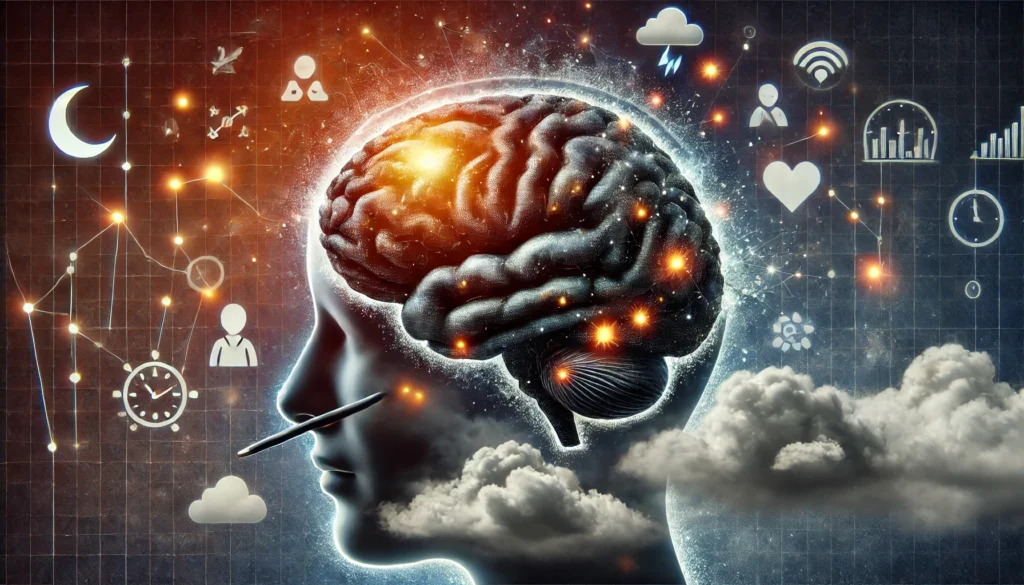Sleep is a universal human experience. It’s a vital physiological process that we all engage in daily.
Yet, it’s also a complex psychological phenomenon. It’s a subject that has intrigued psychologists for decades.
Why do psychologists study sleep? The answer lies in the intricate relationship between sleep and our mental and physical health.
Sleep affects our mood, cognition, and behavior. It’s linked to our memory, judgment, and emotional regulation.
Conversely, our mental health can influence our sleep patterns. Many mental health disorders have sleep-related symptoms.
Understanding sleep can help us manage these disorders. It can also enhance our overall well-being.
This article delves into the fascinating world of sleep psychology. It explores why psychologists study sleep and the insights they’ve gained.
From the effects of sleep deprivation to the role of dreams, we’ll uncover the psychological significance of sleep. We’ll also discuss how these insights can be applied to optimize mental and physical health.
You May Also Like: Why Do We Sleep? Exploring the Importance of Rest for Optimal Focus and Performance
The Importance of Sleep in Psychology
Psychologists view sleep as crucial to understanding human behavior. It serves as a window into our cognitive processes and emotional well-being.
Sleep psychology investigates how sleep influences the human mind. Researchers analyze how it impacts cognitive functions and emotional states.
The field addresses various aspects:
- Memory consolidation
- Emotional regulation
- Cognitive performance
- Behavioral outcomes
The intersection of sleep and psychology allows for better treatment of mental health conditions. Knowing how sleep affects mental processes is fundamental for developing interventions.
Psychologists use sleep research to improve therapeutic techniques. For instance, they use it to enhance methods like cognitive-behavioral therapy.
By studying sleep, psychologists gain insights into subconscious thoughts and desires. Dreams, often occurring during REM sleep, reveal a lot about the mind’s workings.
How Sleep Affects Mental and Physical Health
Sleep acts as a cornerstone for both mental and physical health. Quality sleep supports emotional stability and physical vitality.
When we sleep well, we think clearer and feel more balanced. Good sleep boosts focus and strengthens emotional resilience.
In contrast, inadequate sleep can derail both mental and physical functions. It often leads to irritability, poor decision-making, and even physical ailments.
Prolonged sleep deprivation can compound these effects, resulting in serious health issues. Conditions like hypertension and depression are often linked with poor sleep.
Understanding sleep’s far-reaching impacts is key to enhancing overall wellness. It sheds light on how lifestyle changes can promote better health.
The Link Between Sleep and Mental Health Disorders
Sleep disruptions often accompany mental health disorders. Insomnia, for example, is prevalent among those with anxiety or depression.
Poor sleep can worsen psychiatric symptoms. It contributes to heightened anxiety, despair, and cognitive decline.
Addressing sleep issues in therapy can benefit mental health significantly. Treatment plans often incorporate sleep-focused interventions.
Psychologists emphasize the bidirectional relationship between sleep and mental health. Better sleep can improve mental health, and vice versa. This interconnection highlights the importance of holistic approaches in treatment.

Understanding Sleep Stages and Their Psychological Significance
Sleep comprises various stages that hold unique psychological importance. These stages include Non-REM (NREM) and REM sleep.
NREM sleep has three phases, with each serving a distinct purpose. It is crucial for physical restoration and memory consolidation.
REM sleep, often linked to dreaming, involves rapid eye movements and increased brain activity. It plays a role in emotional regulation.
Psychologists explore how transitions between these stages affect cognitive and emotional health. These transitions influence how well we feel rested and restored upon waking.
Understanding these stages helps explain sleep disorders and their psychological impacts. Better insights lead to improved treatment strategies for sleep-related issues.
REM vs. Non-REM Sleep: What Psychologists Observe
REM sleep captures much attention in psychological studies. During REM, the brain is highly active, resembling wakefulness.
This stage is critical for creativity and problem-solving. The brain organizes and processes complex information during REM cycles.
Non-REM sleep, however, is pivotal for physical recovery. It supports the body in repairing tissues and strengthening the immune system.
Psychologists examine these stages to see how they interact with mental health. They look at how imbalances could contribute to cognitive and emotional difficulties.
Dreams and the Subconscious: A Window into the Mind
Dreams predominantly occur during REM sleep, providing insights into the subconscious. Psychologists analyze dreams to uncover hidden thoughts and emotions.
Dreams often weave together fragments of waking experiences. They help process emotions and consolidate memories.
By studying dreams, psychologists seek to unravel the complexities of the unconscious mind. This analysis is valuable in understanding mental health conditions.
Exploring the role of dreams offers a richer comprehension of how the mind functions during sleep. These insights continue to inform therapeutic and clinical practices.
The Consequences of Sleep Deprivation on Cognitive Functions
Sleep deprivation has a profound impact on cognitive abilities. It is a major area of concern for psychologists and health professionals.
When we lack sleep, our brain struggles to operate efficiently. We experience slower reaction times and diminished attention spans.
Critical thinking and problem-solving skills also suffer. Sleep deprivation impairs our ability to process information and make decisions.
Furthermore, prolonged lack of sleep can affect neural connections. This impacts learning and memory retention, essential for daily functioning.
With insufficient rest, the brain finds it difficult to clear toxins, leading to cognitive fog. This condition highlights the importance of sleep for cognitive health.
Memory, Judgment, and Mood: The Toll of Poor Sleep
Memory consolidation is one of the first casualties of sleep loss. Poor sleep interferes with the brain’s ability to integrate new information.
Judgment becomes impaired as well. Lack of sleep affects the prefrontal cortex, the area responsible for decision-making.
Mood disturbances are also common among those with inadequate rest. Sleep deprivation heightens stress levels and emotional reactivity.
Over time, these cognitive disruptions can lead to more serious mental health issues. Understanding these impacts emphasizes the need for good sleep hygiene.

Sleep Disorders and Psychological Interventions
Sleep disorders can significantly disrupt daily life. They pose challenges not only to sleep quality but also to overall well-being.
Psychologists study these conditions to develop effective interventions. Their goal is to alleviate the symptoms and improve life quality for sufferers.
Common sleep disorders include insomnia, sleep apnea, and narcolepsy. Each affects sleep differently and requires a tailored approach.
Psychological research provides insights into the underlying causes of these disorders. These insights lead to the development of targeted therapies.
Moreover, addressing sleep disorders often involves interdisciplinary efforts. Psychologists collaborate with medical professionals to create comprehensive treatment plans.
From Insomnia to Narcolepsy: Psychological Perspectives
Insomnia is one of the most prevalent sleep disorders. It is characterized by difficulty falling or staying asleep, impacting daily performance.
The psychological perspective on insomnia examines both mental and behavioral factors. Stress, anxiety, and poor sleep habits often contribute to sleeplessness.
In contrast, narcolepsy involves uncontrollable sleep episodes during the day. It can lead to serious disruptions in social and professional life.
Research into narcolepsy focuses on neurological components. Psychologists work to understand how brain chemistry and structure contribute to this condition.
By exploring these disorders through a psychological lens, researchers aim to develop strategies to mitigate their effects.
Cognitive-Behavioral Therapy for Insomnia (CBT-I) and Other Treatments
Cognitive-Behavioral Therapy for Insomnia (CBT-I) is a highly effective treatment. It combines behavioral techniques with cognitive strategies to improve sleep.
CBT-I helps patients identify and change negative thoughts about sleep. It emphasizes the development of healthy sleep patterns.
Unlike medication, CBT-I addresses the root causes of insomnia. It aims to create long-term changes in sleep behavior and cognitive processes.
In addition to CBT-I, other therapies are explored. These include relaxation techniques and biofeedback to enhance sleep quality.
Overall, psychological interventions offer promising solutions. They provide individuals with tools to manage their sleep and improve overall mental health.
The Role of Sleep in Biohacking and Cognitive Enhancement
Biohacking involves optimizing health through science and self-experimentation. Sleep is a critical component of this movement.
Optimizing sleep can lead to heightened mental and physical performance. Biohackers view sleep as a foundation for enhancing cognition and overall wellbeing.
Sleep affects every facet of our daily function. Biohackers often experiment with sleep strategies to maximize rest and rejuvenation.
Emerging technologies and tools play a significant role here. Devices like sleep trackers provide valuable data on sleep quality and patterns.
These insights enable precise adjustments to sleep routines. Such strategies can lead to improved productivity and sharper mental clarity.
Nootropics and Sleep: Enhancing Mental Performance
Nootropics are substances that enhance brain function. They are popular among those seeking improved cognitive performance.
Some nootropics aim to support sleep quality. They work by promoting relaxation and reducing stress, which can lead to better sleep.
Ingredients like melatonin, magnesium, and L-theanine are common. These supplements are favored for their ability to foster deep, restful sleep.
Other nootropics focus on brain health and function during waking hours. They work to boost focus, memory, and overall mental acuity.
Incorporating these substances should be approached with care. It’s important to understand their effects and consult with professionals when needed.
Practical Tips for Optimizing Sleep and Mental Acuity
Improving sleep is achievable with some practical steps. Small changes can have significant effects on mental sharpness and energy.
Firstly, establish a consistent sleep schedule. Going to bed and waking up at the same times helps regulate the body’s internal clock.
Minimize exposure to screens before bedtime. The blue light emitted can interfere with melatonin production, disrupting sleep.
Engage in a relaxing pre-sleep routine. Activities like reading or meditation can signal the body that it’s time to wind down.
Ensure your sleep environment is conducive to rest. Comfortable bedding, appropriate room temperature, and reducing noise can greatly enhance sleep quality.
Maintain a balanced diet and exercise regularly. Physical health contributes to better sleep and increased mental alertness.
- Stick to a regular sleep schedule.
- Limit screen time before bed.
- Follow a relaxing pre-sleep routine.
- Create a sleep-friendly environment.
- Eat well and exercise regularly.
These adjustments can help improve sleep and boost cognitive function. Incorporating these practices into daily life can contribute to a healthier mind and body.

Conclusion: Integrating Sleep Psychology into Health and Wellness Practices
Understanding sleep psychology offers profound benefits for enhancing health. It emphasizes the essential role of sleep in mental and physical wellbeing.
Incorporating these insights into daily routines can improve life quality. Engaging with the latest sleep research aids in crafting more effective health strategies.
Health professionals, like wellness coaches, benefit from this knowledge. They can guide clients with evidence-based recommendations for better sleep hygiene.
Furthermore, science journalists can translate these findings for the public. By shedding light on the complexities of sleep, they help demystify its importance.
For biohackers, sleep psychology opens new frontiers to explore. Adopting researched-backed practices can lead to optimized mental and physical performance.
Overall, sleep is a cornerstone of holistic health. Embracing sleep psychology is crucial for achieving sustained wellness and a vibrant life.
Further Reading:
Verywell Mind: What Can a Sleep Study Tell You About Your Mental Health?
Insights Psychology: The Psychology of Sleep: Why Is Sleep Important for Our Mental and Physical Health?
Learning Memory: The role of sleep in changing our minds: A psychologist’s discussion of papers on memory reactivation and consolidation in sleep
Important Note: The information contained in this article is for general informational purposes only, and should not be construed as health or medical advice, nor is it intended to diagnose, prevent, treat, or cure any disease or health condition. Before embarking on any diet, fitness regimen, or program of nutritional supplementation, it is advisable to consult your healthcare professional in order to determine its safety and probable efficacy in terms of your individual state of health.
Regarding Nutritional Supplements Or Other Non-Prescription Health Products: If any nutritional supplements or other non-prescription health products are mentioned in the foregoing article, any claims or statements made about them have not been evaluated by the U.S. Food and Drug Administration, and such nutritional supplements or other health products are not intended to diagnose, treat, cure, or prevent any disease.


